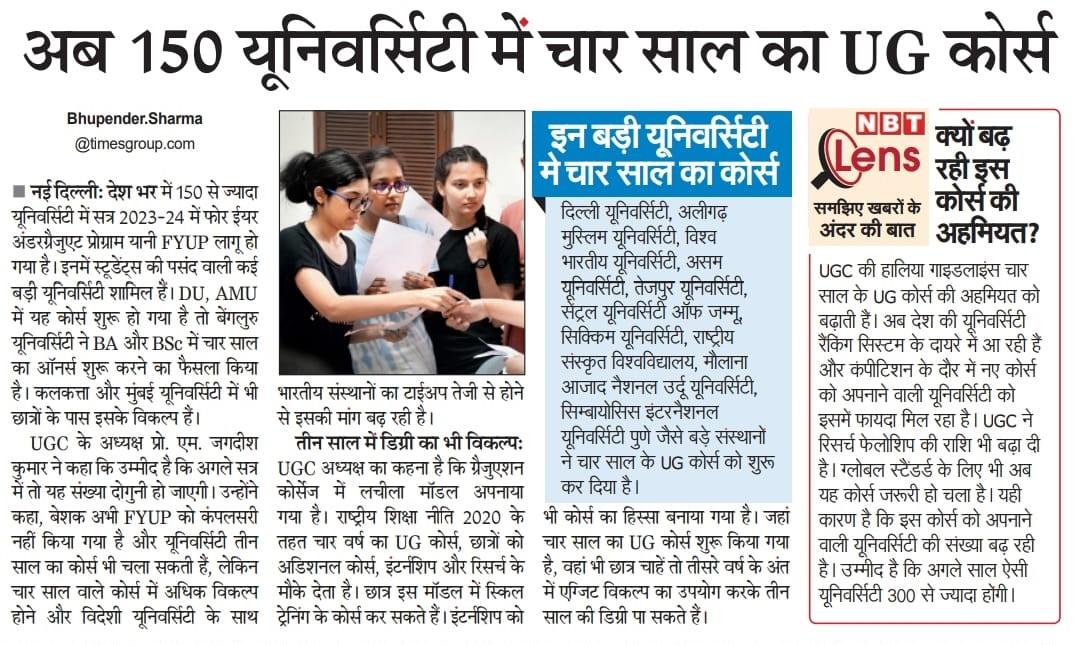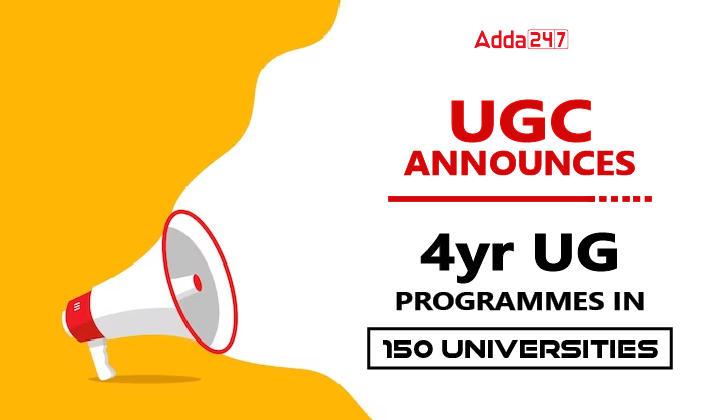Table of Contents
The University Grants Commission (UGC) has announced FYUP Programme under NEP 2020. More than 150 universities, including 19 central universities, will start the Four-Year Undergraduate Programme (FYUGP) from the upcoming academic session. The move is part of the National Education Policy (NEP) 2020, which recommends that undergraduate degrees be of either three or four years duration, with multiple exit options within this time period and appropriate certifications.

As per UGC update, FYUP i.e. four-year multidisciplinary Bachelor’s programme will be the preferred option, as it provides the opportunity to experience the full range of holistic and multidisciplinary education, as well as a focus on the students’ chosen major and minors. Based on the recommendations of the NEP, the UGC has created a new student-centered “Curriculum and Credit Framework for Undergraduate Programmes (CCFUP)” that includes a flexible Choice-based Credit System (CBCS), a multidisciplinary approach, and multiple entry and exit options.
FYUP Central Universities
Central universities such as Delhi University, Aligarh Muslim University, Visva Bharati University, Assam University, Silchar, Tezpur University, Central University of Jammu, Sikkim University, National Sanskrit University, and Maulana Azad National Urdu University will be offering four-year undergraduate programmes.Furthermore, the list expands to encompass institutions like the Shri Lal Bahadur Shastri National Sanskrit University, English And Foreign Languages University, Hemvati Nandan Bahuguna Garhwal University, Mahatma Gandhi Antarrashtriya Hindi Vishwavidyalaya, Rajiv Gandhi University, and central universities located in Haryana, South Bihar, and Tamil Nadu. In addition to the central universities, more than 40 deemed-to-be universities, 18 state private universities, and 22 state universities will also introduce the FYUGP.
What is FYUP Framework
FYUP framework calls for a credit range of 20-22 credits per semester. Semesters 1-3 aim to develop an understanding of all major areas of learning, including natural sciences, social sciences, humanities, mathematical and computational thinking and analysis, and vocational education. In semesters 4-6, students will select a disciplinary or interdisciplinary area of learning for specialisation as a major and minor. During semesters 7 and 8, they will work on research projects while also taking advanced disciplinary and interdisciplinary courses.
FYUGP Features
The following are some of the key features of the FYUGP:
- Multiple entry and exit options: Students can exit the programme with a certificate after one year, a diploma after two years, or a bachelor’s degree after three or four years.
- Flexible CBCS: Students can choose their courses from a wide range of options, including core courses, major and minor courses, and elective courses.
- Multidisciplinary approach: The FYUGP emphasizes multidisciplinary learning, which will help students develop a broader perspective on the world.
- Research focus: The FYUGP includes a research component in the final two semesters, which will help students develop their critical thinking and problem-solving skills.
Benefits of UGC FYUGP Programme
The UGC FYUGP Programme offers a number of benefits to students, including:
- Greater flexibility and choice: Students can choose the path that is right for them, with multiple entry and exit options and a flexible CBCS.
- A broader and more interdisciplinary education: Students will have the opportunity to learn about a wider range of subjects and develop a broader perspective on the world.
- A stronger focus on research: The FYUGP includes a research component in the final two semesters, which will help students develop their critical thinking and problem-solving skills.
- Enhanced employability: The FYUGP will produce graduates who are well-rounded and have the skills and knowledge to succeed in the workplace.
- Improved quality of education: The FYUGP is aligned with international best practices and is expected to improve the quality of undergraduate education in India.
- Increased access to higher education: The FYUGP’s multiple entry and exit options will make higher education more accessible to students from all backgrounds.
- Greater research productivity: The FYUGP’s focus on research is expected to lead to increased research productivity in Indian universities.
- Enhanced global competitiveness: The FYUGP will produce graduates who are globally competitive and can contribute to India’s economic and social development.
Conclusion
The FYUGP is a significant reform of undergraduate education in India. It is expected to provide students with a more holistic and flexible education that will prepare them for the challenges of the 21st century.This transformation in the higher education system signifies a major shift in India’s approach to undergraduate education, prioritizing multidisciplinary learning and providing students with a broader and more flexible academic experience. As these changes take effect in the upcoming academic session, it is expected to reshape the landscape of undergraduate education across the country.




 Difference between ICAR NET vs CSIR NET ...
Difference between ICAR NET vs CSIR NET ...
 What Is A Good Score In CSIR NET Life Sc...
What Is A Good Score In CSIR NET Life Sc...
 Important Topics for CSIR NET Chemical S...
Important Topics for CSIR NET Chemical S...




